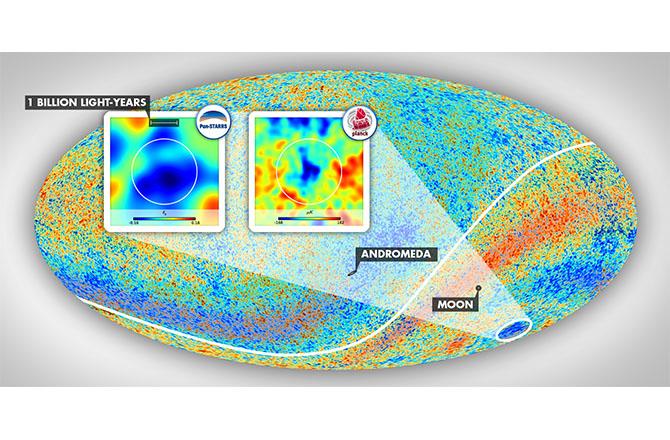Astronomers discover the largest structure in the universe


The universe's largest known structure has turned out to be nothing more than a supervoid — a.k.a, a really big hole.
Scientists discovered the supervoid, a blob that's a stunning 1.8 billion light years across, during a recent astronomical survey. Istvan Szapudi, who led the research, told The Guardian that the hole may be "the largest individual structure ever identified by humanity."
Szapudi explained that the astronomers had hoped to find the void, because it provides an explanation for why previous reports showed the area as "unusually cool," The Guardian reports. The new research suggests that the "Cold Spot," where the hole was discovered, could be a result of the supervoid draining the energy from light traveling through the region. The void could help explain the universe's formation after the Big Bang, because light photons would lose energy and become cooler after passing through the void, The Guardian explains.
The Week
Escape your echo chamber. Get the facts behind the news, plus analysis from multiple perspectives.

Sign up for The Week's Free Newsletters
From our morning news briefing to a weekly Good News Newsletter, get the best of The Week delivered directly to your inbox.
From our morning news briefing to a weekly Good News Newsletter, get the best of The Week delivered directly to your inbox.
A giant hole may not seem exciting, but for scientists, the rare find is spectacular. "It just pushed the explanation one layer deeper," Roberto Trotta, a cosmologist at Imperial College London, told The Guardian. "Now we have to figure out how does the void itself form."
A free daily email with the biggest news stories of the day – and the best features from TheWeek.com
Meghan DeMaria is a staff writer at TheWeek.com. She has previously worked for USA Today and Marie Claire.
-
 Can Trump make single-family homes affordable by banning big investors?
Can Trump make single-family homes affordable by banning big investors?Talking Points Wall Street takes the blame
-
 One great cookbook: ‘Kismet: Bright, Fresh, Vegetable-Loving Recipes’
One great cookbook: ‘Kismet: Bright, Fresh, Vegetable-Loving Recipes’the week recommends The beauty and wonder of great ingredients and smart cooking
-
 Political cartoons for January 12
Political cartoons for January 12Cartoons Monday’s political cartoons include Mayflower colonisers, Lady Lawless, and more
-
 Blue Origin launches Mars probes in NASA debut
Blue Origin launches Mars probes in NASA debutSpeed Read The New Glenn rocket is carrying small twin spacecraft toward Mars as part of NASA’s Escapade mission
-
 Dinosaurs were thriving before asteroid, study finds
Dinosaurs were thriving before asteroid, study findsSpeed Read The dinosaurs would not have gone extinct if not for the asteroid
-
 SpaceX breaks Starship losing streak in 10th test
SpaceX breaks Starship losing streak in 10th testspeed read The Starship rocket's test flight was largely successful, deploying eight dummy satellites during its hour in space
-
 Rabbits with 'horns' sighted across Colorado
Rabbits with 'horns' sighted across Coloradospeed read These creatures are infected with the 'mostly harmless' Shope papilloma virus
-
 Lithium shows promise in Alzheimer's study
Lithium shows promise in Alzheimer's studySpeed Read Potential new treatments could use small amounts of the common metal
-
 Scientists discover cause of massive sea star die-off
Scientists discover cause of massive sea star die-offSpeed Read A bacteria related to cholera has been found responsible for the deaths of more than 5 billion sea stars
-
 'Thriving' ecosystem found 30,000 feet undersea
'Thriving' ecosystem found 30,000 feet underseaSpeed Read Researchers discovered communities of creatures living in frigid, pitch-black waters under high pressure
-
 New York plans first nuclear plant in 36 years
New York plans first nuclear plant in 36 yearsSpeed Read The plant, to be constructed somewhere in upstate New York, will produce enough energy to power a million homes
